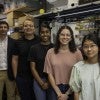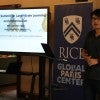
The course co-taught by Juan José Castellón and Kalil Erazo paired architecture and engineering students to study how sustainable structures are conceived and built.

The course co-taught by Juan José Castellón and Kalil Erazo paired architecture and engineering students to study how sustainable structures are conceived and built.

Ripples of the future: Rice researchers unlock powerful form of quantum interference
Rice researchers have demonstrated a form of quantum interference two orders of magnitude greater than any previously reported.

Luay Nakhleh, dean of the George R. Brown School of Engineering and Computing, has received a $1.9 million grant from the National Science Foundation to build a powerful new software infrastructure that could significantly expand how scientists study evolution.

A smarter membrane for cleaner water
A team of researchers led by Menachem Elimelech and his former postdoctoral researcher Yanghua Duan at Rice has taken a major step toward solving one of water purification’s biggest puzzles: how to best design catalytic membranes that simultaneously filter and transform contaminants in a single step.

In low-resource settings, babies born with gastroschisis — a congenital condition in which the developing intestines extend outside the body through a hole in the abdominal wall — face life-threatening challenges.

Interns innovate for impact at Rice’s Summer Experience in Engineering Design showcase
In an impressive display of creativity, collaboration and global impact, undergraduate students from around the world gathered at Rice July 24 to present the results of their seven-week Summer Experience in Engineering Design internship.

Tapia STEM Camps inspire more than 1,200 students worldwide to pursue science careers
Founded by Richard Tapia, the summer camps encourage students from all communities to pursue careers in STEM.

James F. Young, professor emeritus of electrical and computer engineering, dies at 81
James F. Young, professor emeritus of electrical and computer engineering at Rice, died May 18 in Hawaii. He was 81.

Rice SSPEED Center’s FIRST system provides critical flood warnings in real time
In the aftermath of the devastating July 2025 floods in the Texas Hill Country, the need for reliable, real-time flood warning systems has never been more urgent.

Rice scientists discover way to engineer stronger soft devices through smarter silicone bonding
In a step forward for soft robotics and biomedical devices, Rice engineers have uncovered a powerful new way to boost the strength and durability of silicone-based soft devices without changing the materials themselves.

No hype, just breakthroughs: Rice AI summit quietly makes waves in Paris
Some of the world’s top minds in machine learning, optimization and distributed systems gathered this summer in the heart of Paris.

Nash and Swingle join leadership team at Rice Biotech Launch Pad
The Rice Biotech Launch Pad has appointed Amanda Nash and Kelsey L. Swingle to its leadership team.

Artificial intelligence is infamous for its resource-heavy training, but a new study may have found a solution in a novel communications system that markedly improves the way large language models train.

Rice experts are available to comment on digital health topics, including AI, wearable and ingestible devices, imaging and robotics.

Vanishing shores: Coastal geologist issues urgent call to save the Gulf Coast
For John B. Anderson, the W. Maurice Ewing Professor Emeritus of Oceanography at Rice, the Gulf Coast is personal.